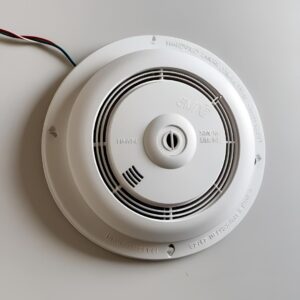Are you aware that operable smoke detectors in your home can reduce your risk of dying in a house fire by more than 50%? These devices play a vital role in safeguarding houses, but not all of them offer the same level of protection. When comparing hardwired vs battery smoke detector, each type has its own advantages and disadvantages.
Deciding on the right type of smoke detector for your home goes beyond convenience. It varies, depending on your household’s particular needs, the wiring in your home and, yes, local building codes. Here, this article breaks down everything you need to know about hardwired vs. battery smoke detector to help you decide what would be best for your home.
What Are Hardwired Smoke Detectors?
What They Are and How They Work
Hardwired smoke detectors connect directly to your home’s electrical system, providing constant power. Most of them are with backup batteries, which means they will continue to work even if the electricity goes out.
Key Features and Capabilities
- Interconnection: A number of hardwired detectors can be interconnected, which means that when one alarm sounds, so do all the alarms in the home, at the same time.
- Home System Integration: These sensors are often integrated within home security systems or smart home setups which enable more thorough monitoring.
- Built-in Backup: If the primary power source fails, the backup battery ensures uninterrupted coverage.
Lifespan and Maintenance
Usually, hardwiring smoke sensors last 8–10 years. Although their primary power source is dependable, backup batteries should be examined and changed yearly to guarantee the system stays operational.
What Are Battery-Operated Smoke Detectors?
What They Are and How They Work
Battery-operated smoke detectors are independent units that are powered entirely by batteries. These are especially ideal for homes without prewired detectors, as there’s no electrical connection needed.
Key Features and Capabilities
- Portable and DIY-Friendly: Easy to install and move as needed.
- Battery-Powered Operation: Can use replaceable batteries or sealed lithium batteries that last up to 10 years.
Lifespan and Maintenance
Battery-operated smoke detectors have a similar lifespan of 8–10 years for the device itself. However, if the model uses replaceable batteries, they need to be swapped out annually (or sooner if low). Sealed lithium battery models require less frequent maintenance.
Key Differences Between Hardwired and Battery Smoke Detectors
Installation Requirements and Costs
- Hardwired: Requires professional installation and possibly electrical system updates, adding to the upfront costs.
- Battery-Operated: No professional help needed; a straightforward DIY installation is enough.
Reliability During Power Outages
Wired detectors rely on your home’s electrical system but provide backup battery support. Battery-powered models, on the other hand, do not depend on electricity, allowing them to operate completely during power failures.
Interconnectivity
Hardwired models excel in this regard as they can interact with one another, providing faster responses throughout the home. The majority of battery-powered models do not link together unless they are designed for wireless connectivity.
Maintenance Needs
Both varieties necessitate routine inspections for proper operation. Nonetheless, battery-powered models require more regular.
Pros and Cons of Hardwired Smoke Detectors
Pros:
- Uses your home’s electrical system for consistent power.
- Interconnected alarms provide faster notifications during emergencies.
- Can integrate seamlessly with smart home or security systems.
Cons:
- Higher upfront costs due to professional installation.
- Harder to relocate once installed.
- Backup batteries require regular upkeep.
Pros and Cons of Battery-Operated Smoke Detectors
Pros:
- Lower upfront costs and quick, effortless installation.
- Highly portable, making it easy to change locations.
- No reliance on a home’s electrical wiring.
Cons:
- Regular battery replacements can be inconvenient.
- Risk of user neglect, leading to non-functional units due to dead batteries.
- Typically lacks interconnectivity unless it’s a specialized model.
Factors to Consider When Choosing the Best Option for Your Home
- Home Type and Age
If your home isn’t pre-wired for detectors, battery-operated models are a simpler solution. However, newer homes often come with hardwired systems pre-installed.
- Budget
Hardwired detectors involve higher upfront costs due to installation, whereas battery-operated models are more economical initially.
- Safety Needs
Larger families or multi-story homes might benefit from hardwired interconnected alarms for faster warnings. Smaller households may find battery-operated models sufficient.
- Local Building Codes
Some regions mandate the use of hardwired smoke detectors in new constructions or during major remodels. Check your area’s regulations.
The Best of Both Worlds?
You don’t necessarily have to choose! Many homeowners opt for a hybrid approach. For instance:
- Install hardwired smoke detectors in key areas (e.g., hallways and kitchens) to take advantage of interconnectivity and stability.
- Place battery-operated models in less easily wired spaces, like attics or detached garages, ensuring comprehensive coverage.
Alternatively, explore smart smoke detectors that combine the benefits of both systems. Brands like Nest Protect offer features such as app notifications, interconnectivity, and a battery backup, providing advanced and flexible solutions.
Start Protecting Your Home Today
Deciding between hardwired vs battery smoke detector ultimately depends on your home’s configuration, finances, and particular requirements. Here’s a brief checklist to assist you in navigating the process:
- Audit your current smoke detectors. Are they functional? Do battery models have power?
- Consider your home layout. Do you need interconnected alarms or portable ones for additional coverage?
- Refer to local codes to ensure compliance.
To gain additional reassurance, seek the advice of a qualified electrician to examine your home’s smoke detector setup. Implementing these preventive measures now may protect lives later and save you from the challenges of selling a fire-damaged house.
Make safety a priority and take action now. Your home and loved ones deserve nothing less.
Previous